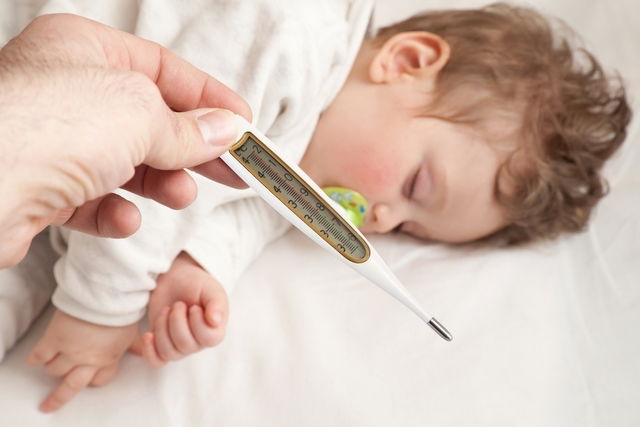Respiratory syncytial virus, or RSV, is a microorganism that causes respiratory airway infections. It can infect adults and children, however it is most commonly seen in babies under 6 months, premature newborns and babies who have a history of a chronic lung issue or congenital heart disease.
Symptoms depend on the age and health status of the patient, but the most common ones include runny nose, coughing, difficulty breathing and fever. Diagnosis is usually confirmed by a doctor after assessing the symptoms and ordering a nose swab. Generally, the virus resolves within 6 days, and treatment involves nasal saline rinses and medications that treat the fever.
Nonetheless, if a child or baby presents with blue lips, in-drawing of the chest when breathing or increased work of breathing, you should seek medical attention immediately.

Main symptoms
RSV affects the respiratory airways and can lead to symptoms like:
- Stuffy nose
- Runny nose
- Coughing
- Difficulty breathing
- Wheezing when inhaling
- Fever
In children, symptoms are usually more intense. Increased work of breath can be visualized in the throat (with deep retraction of the throat under the Adams apple), nasal flaring, and in-drawing of the chest. Decreased oxygen levels can also be noted with purple or blue lips. If any of these symptoms occur, you should proceed immediately to the hospital. as these are signs that the infection has reached the lungs, possibly causing bronchiolitis.
How it is diagnosed
Diagnosis of RSV is confirmed through assessment by a doctor. The doctor may also opt to order additional testing to confirm RSV, such as blood work (to evaluate whether white blood cells are elevated to fight off the virus) and a nasal swab.
Nasal swabs collect a sample of respiratory secretions in the nostrils for analysis in the laboratory. Health care worker caring for patients in the hospital or in the community, and other caregivers at home should take precautions to protect themselves from the virus, like wearing disposable masks, gowns and gloves.
Treatment options
The virus usually lasts for about 6 days, and therefore treatment of RSV is aimed at supporting any presenting symptoms, like performing nasal rinses, drinking plenty of water and maintaining a healthy diet. Learn more about how to perform a nasal irrigation at home.
However, if symptoms are very intense and you are experiencing a high-grade fever, you doctor may prescribe medications like anti-pyretics, corticosteroid or bronchodilators. Some patients require respiratory physiotherapy to help eliminate any built-up secretions in the lungs. Check out the medications and natural remedies you can use to break a fever.
Many times, children under the age of one require admission to the hospital, as RSV often develops into bronchiolotis. This condition usually requires treatment through IV, inhalation therapy and oxygenation.
Learn more about how to treat fevers in babies at home.
How does it spread
RSV is transmitted from a contaminated person to another through respiratory secretions, like phlegm and droplets from coughing or sneezing. The virus multiplies once it reaches the lining of the mouth, nose or eyes. This virus can also survive on certain surfaces, like cups, forks and spoons for a period of up to 24 hours. Therefore, the virus can also be transmitted through indirect contact.
After exposure to the virus, the incubation period period is usually 4 to 5 days. This means that symptoms will usually only appear after this period.
RSV is usually a seasonal virus, meaning it is mostly seen in the wintertime. This is a time of the year where people tend to be in closed spaces in closer quarters. However, it is also commonly transmitted in early spring, due to dry climates with low humidity.
How to prevent it
The risk of catching RSV can be reduced by ensuring adequate hand hygiene (washing or sanitizing your hands frequently) and by avoiding closed or crowded areas during the winter.
Because this virus can develop into bronchiolitis in babies, you should take some extra precautions with babies, like avoiding cigarette smoke exposure, continuing breastfeeding for as long as possible to strengthen the immune system, and avoiding any contact with infected people. Premature babies, or babies with chronic lung or heart problems may be prescribed the Palivizumab vaccine, which is an monoclonal antibody injection that stimulates defense cells.
